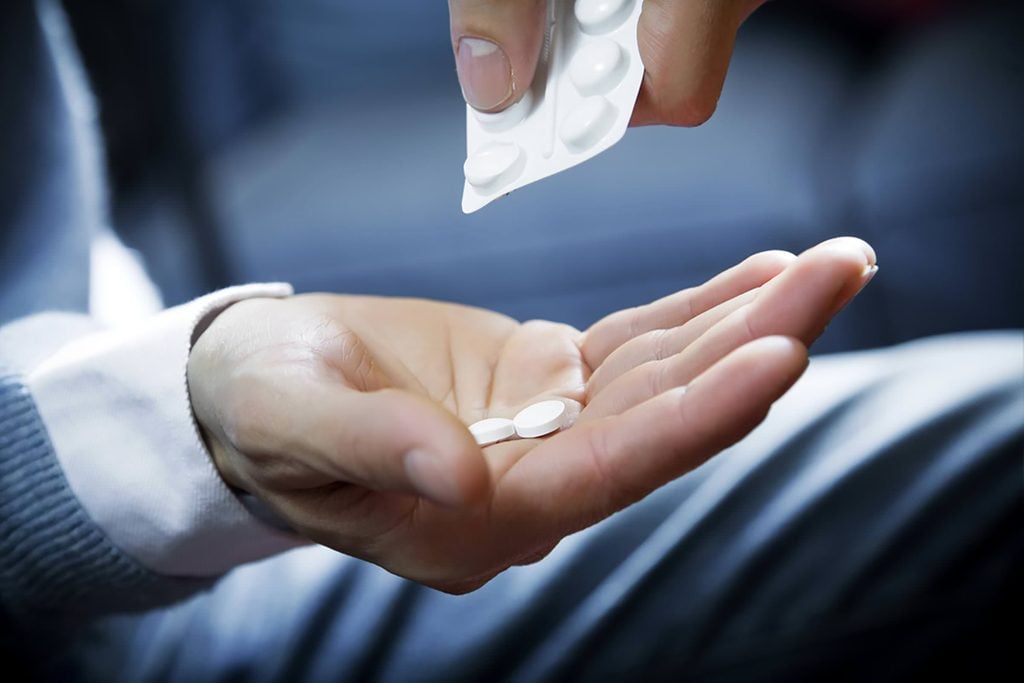If You Take Acid Reflux Meds, Your Liver Could Be in Trouble
Updated: Oct. 19, 2017
If you take this kind of antacid, you may be putting your liver at risk—especially if you like a few glasses of wine with dinner or regularly indulge in cocktails or beer.
 You wouldn’t think heartburn is that big a deal, but acid reflux can lead serious health issues—so make sure you can recognize the silent symptoms of acid reflux. Officially known as gastroesophageal reflux disease (GERD), the issue may respond to home remedies; changing your diet can also ease acid reflux. However, it’s become more and more common for doctors to prescribe a type of drug that suppresses the production of stomach acid—they’re known as proton pump inhibitors (PPIs—Prilosec, Nexium, and Prevacid, for example). In fact, PPI’s are one of the most commonly prescribed medications in the world—as many as 15 percent of the world’s population is on one form or another. Now, research from the University of California in San Diego suggests that these popular drugs may be triggering a dramatic increase in chronic liver disease.
You wouldn’t think heartburn is that big a deal, but acid reflux can lead serious health issues—so make sure you can recognize the silent symptoms of acid reflux. Officially known as gastroesophageal reflux disease (GERD), the issue may respond to home remedies; changing your diet can also ease acid reflux. However, it’s become more and more common for doctors to prescribe a type of drug that suppresses the production of stomach acid—they’re known as proton pump inhibitors (PPIs—Prilosec, Nexium, and Prevacid, for example). In fact, PPI’s are one of the most commonly prescribed medications in the world—as many as 15 percent of the world’s population is on one form or another. Now, research from the University of California in San Diego suggests that these popular drugs may be triggering a dramatic increase in chronic liver disease.
Previous research had suggested a potential link between liver disease and PPIs: Compared to the general population, people with liver disease are much more likely to be taking PPIs. Nearly a third of people with non-alcohol-related liver damage are on the drugs, and three out of four of those with alcohol-related liver disease regularly use PPIs. In previous research, the UCSD researchers had found that squashing production of stomach acid could alter bacteria populations in the gut, and that some of those bacteria—particularly Enterococcus—could damage the liver. However, no one had actually connected the dots between PPI use and liver damage.
To test their theory, the researchers blocked stomach acid production in mice via genetic engineering or with a PPI. After analyzing stool samples from the mice, the researchers found a proliferation of the Enterococcus bacteria. What’s more, the researchers were able to establish that the bacterial overgrowth clearly led to liver illness and injury in the mice.
Although the new study, published in the journal Nature Communications, suggests a link, human studies need to be done to confirm the connection between PPIs and liver disease, says senior author Bernd Schnabl, MD, associate professor of gastroenterology at UC San Diego School of Medicine, in a press release from the UC San Diego News Center. In the meantime, the initial data should at least get people thinking about reducing their use of PPIs in cases where they aren’t a necessity. One thing is clear: Mixing alcohol use and PPIs is unwise, the researchers say.
There are inexpensive and readily available alternatives to PPIs, although these also affect the gut microbiome to a lesser degree. The safest option for any GERD patients is to try non-pharmacological methods, such as losing weight and reducing intake of alcohol, caffeine, and fatty and spicy foods. Looking for guidance? If you’re suffering from acid reflux, you should definitely consider avoiding these foods.
